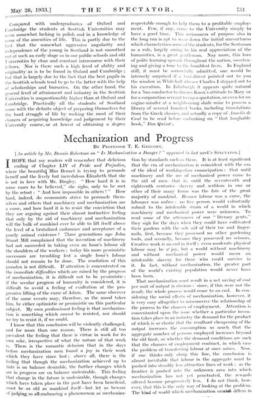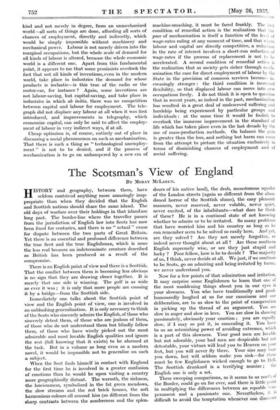Mechanization and Progress By PROFESSOR T. E. Gal:Golly.
[An article by Mr. Dennis Robertson. on " Is Mechanization a Danger? " appeared in last week's SPEcTATou.1 IHOPE that my readers will remember that delicious ending of Chapter LIV of Pride and Prejudice, where the beautiful Miss Bennet is trying to persuade herself and the lively but incredulous Elizabeth that she is not in love with Mr. Bingley. " How hard it is in some cases to be believed," she sighs, only to be met by the retort : " And how impossible in others ! " How hard, indeed, do economists strive to persuade them- selves .and others that machinery and mechanization are a curse, and how hard it is to resist the conviction that they are arguing against their almost instinctive feeling that only by the aid of machinery and mechanization will the. bulk of mankind ever be able to lift itself above the level of a brutalized endurance and acceptance of a purely animal existence ! Three generations ago John Stuart Mill complained that the invention of machinery had not succeeded in taking even an hour's labour off the shoulders of the workers : today his more pessimistic successors are trembling lest a single hour's labour should not remain to be done. The resolution of this paradox .is not difficult. If attention is concentrated on the immediate difficulties which are raised by the progress of mechanization, it is difficult not to be pessimistic : if the secular progress of humanity is considered, it is difficult to avoid a feeling of exultation at the pro- gressive lifting of the curse of Adam. The same observer of the same events may, therefore, as the mood takes him, be either optimistic or pessimiStic on this particular subject. My own predominant feeling is that mechaniza- tion is something which cannot be resisted, nor should we try to resist it, if we could.
I know that this conclusion will be violently challenged, and for more than one reason. There is still all too prevalent the feeling that there is virtue in work for its own sake, irrespective of what the nature of that work is. There is the romantic delusion that in the days before mechanization men found a joy in their work which they have since lost ; above all, there is the feeling that though the mechanization achieved up to date is on balance desirable, the further changes which are in progress are on balance undesirable. This feeling that change in the future is undesirable, though changes which have•taken place in the past have been beneficial, must be as old as mankind itself—but let us beware of i•Vighgso alltembracing a phenomenon ai inechaniza- tion by standards such as these. It is at least significant that the era of mechanization is coincident with the era of the ideal of working-class emancipation : that until machinery and the use of mechanical power came to the aid of men—that is, until the seventeenth and eighteenth centuries slavery and serfdom in one or other of their many forms was the fate of the great majority of mankind. Bern use labour was a curse, the labourer was unfree : no free person would voluntarily submit to the intolerable strain of a world in which machinery and mechanical power were unknown. To read some of the utterances of our " literary gents," they sigh for the days when they could have cultivated their gardens with the sole aid of their toe and finger- nails, first, because they possessed no other gardening tools, and secondly, because they possessed no scissors. Creative work is an end in itself : even moderate physical labour may be ir joy, but a world without machinery and without mechanical power would mean an intolerable • slavery for those who could survive in it. In fact, without mechanization, the greater part of the world's existing population would never have been born.
That mechanization must result in a net saving of cost per unit of output is obvious : since, if this were not the result, the whole process would come to an end. In con- sidering the social effects of mechanization, however, • it is very easy altogether to misconceive the relationship of the process to the chances of employment. Attention is concentrated upon the issue whether a particular inven- tion takeS place in an industry the demand for the product of which is so elastic that the resultant cheapening of the output increases the consumption so much that the aggregate number of persons employed increases beyond the old limit, or whether the demand conditions are such that the chances of employment contract, in which case the problem of transferring labour at once arises. Now, if one thinks only along this line, the conclusion- is almost inevitable that labour in the aggregate must be pushed into steadily less attractive lines of work : as the frontier is pushed into the unknown area into which mechanization has not yet penetrated, the rewards offered become progressively less. I do not think, how- ever, that this is the only way of looking at the problem. The kiwi of world which mechanization ereatit differs in kind and not merely 'in degree, from an unmechanized world—all sorts of things are done, affording all sorts of chances of employment, directly and indirectly, which would be simply impossible without machinery and mechanical power. Labour is not merely driven into the marginal occupations, but the whole scale of demand for all kinds of labour is altered, because the whole economic world is a different one. Apart from this fundamental point, it appears to me that some pessimists overlook the fact that not all kinds of inventions, even in the modern world, take place in industries the demand for whose products is inelastic—is this true of the radio or the motor-car, for instance ? Again, some inventions are not labour-saving, but capital-saving, and take place in industries in which ab initio, there was no competition between capital and labour for employment. The tele- graph did not displace any labour at all when it was first introduced, and improvements in telegraphy, which economize capital, can only be said to affect the employ- ment of labour in very indirect ways, if at all.
Cheap optimism is, of course, entirely out of place in discussing a social phenomenon on such as mechanization. That there is such a thing as " technological unemploy- ment " is not to be denied, and if the process of mechanization is to go on unhampered by a new era of machine-smashing, it must be faced frankly. The iirst condition of remedial action is th6 realization that the pace of mechanization is itself a function of the level of wage-rates ruling at any moment of time, and that where labour and capital are directly competitive, a reduction in the rate of interest involves a short-run reduction of wageLrates if the process of replacement is not to he • accelerated. A second condition of remedial action is the realization that as society gets richer through mech. -anization the case for direct employment of labour by the State in the provision of common services becomes in. creasingly stronger : the third condition is increased flexibility, so that displaced labour can move into new occupations freely. I do not think it is open to question that in recent years, as indeed in the past, mechanization has resulted in a great deal of undeserved suffering and • hardship being experienced by particular groups and individuals : at the same time it would be foolish to overlook the immense improvement in the standard of • life which has taken place even in the last decade by the use of mass-production methods. On balance the gain is greater than the-.loss, and•nothing but harm can come from the attempt to picture the situation exclusively in terms of diminishing chances of employment and of social suffering.

















































 Previous page
Previous page